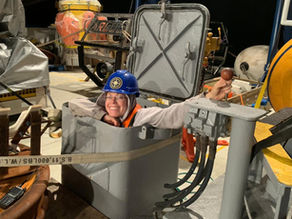Great Reads for Kids: Women in Ocean Science

On this day, January 23, in 1960, Jacques Piccard and US Navy Lieutenant Don Walsh reached a record depth of approximately 10,911 meters (35,797 ft) in the research bathyscaphe Trieste in the Challenger Deep of the Mariana Trench near Guam in the Pacific. Their dive fueled public interest in the deep ocean and opened the door to possibilities never before available. Today, worldwide, we celebrate the wonder of and need for deep-sea research and exploration.
From 200 to nearly 11,000 meters (600 to 33,000 feet) below sea level, the deep sea encompasses the single largest—and arguably the most critical—habitat on Earth
The deep sea is the planet's life-support system. It feeds the upper ocean, which provides more than half the oxygen we breathe, supplies 20% of humanity's protein needs, and supports a $1.5T global ocean economy. The deep sea is responsible for Earth's habitability because it moderates the surface temperature for the entire biosphere.
Despite its indisputable role in shaping Earth's habitable zones, the deep sea is poorly explored, and many details of how it supports our biosphere are not understood. Today, human activities, from overfishing to carbon dioxide emissions, are impacting the deep sea, which will most certainly affect our planet's living space. Dr. Peter Girguis of Harvard University has been studying the deep sea for two decades and notes, "The deep sea is a lot like the basement of your home: It holds all the utilities that keep your house running. If you don't know what's down there, or if you let it go derelict, you have no chance of keeping your home running."
Humanity has long been fascinated with the deep sea, from the Polynesian explorers from millennia past to the first humans to visit the deepest spot in the ocean. Those pioneers remind us of our inextricable connection to the ocean and how important it is that we understand our world's life support system. We all have a role to play in exploring—and protecting—this critical biosphere.
Deep Ocean Quick Facts:
-
The average depth of the ocean is about 2.65 miles (14,000 ft) deep. [4,000 m]
-
The life forms living near hydrothermal vents, unlike any other life forms on Earth, do not rely on photosynthesis and the sun for their energy but on chemicals coming from beneath the surface of the earth.
-
Of the estimated 500,000 to 10 million species living in the deep sea, the majority are yet to be discovered.
-
Approximately 98% of the ocean’ species live in, on, or just above the floor of the sea.
-
The estimated number of seamounts ranges from 30,000 to 100,000.
-
Seamounts are home to a breathtaking array of species (for example, over 850 species were found on seamounts in the Tasman and Coral Seas).
-
Two-thirds of all known coral species live in waters that are deep, dark, and cold — some live three miles deep and are able to survive in -2°C.
-
Some cold-water corals are 5,000–8,500 years old or more, and some grow into beautiful structures that rise up to 35 meters high.
-
Deep-sea corals, sponges and other habitat-forming organisms provide protection from currents and predators, nurseries for young fish, and feeding, breeding, and spawning areas for hundreds of thousands of species.
-
Because deep-sea species live in rarely disturbed environments and tend to be slow growing, late maturing and endemic, they are exceptionally vulnerable to extinction. Many deep-water fish species live 30 years or more. Some, such as orange roughy, can live up to 150 years.
-
Ancient deep-sea corals provide valuable records of climate conditions that may assist our understanding of global climate change.
(Source: https://www.savethehighseas.org/amazing-facts/)
How You Can Celebrate Ocean Exploration Day:
– Celebrate! Share facts and imagery about the wonder of the deep ocean and why it's so important.
– Raise awareness. Post updates on your work in the deep sea and how it is critical to the planet.
– Host an event! From online events and workshops to in-person meet-ups, we will share a full calendar of events here. Send any events you are hosting to ahoy@oceandiscoveryleague.org.
– Learn/Teach. Conduct a deep-sea activity in your classroom or your community.
– Share. Share to raise awareness of the importance of the deep ocean worldwide!






